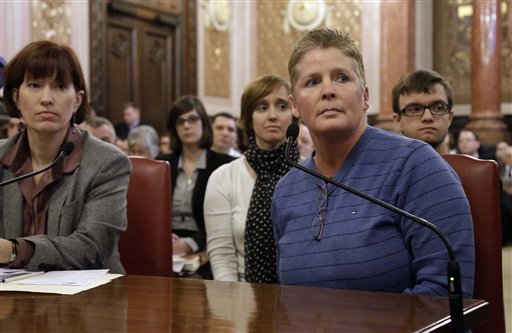(AP) Illinois Senate votes to legalize gay marriage
By SARA BURNETT
Associated Press
SPRINGFIELD, Ill.
The push to allow same-sex marriages in Illinois got its biggest victory to date Thursday with a historic Valentine’s Day vote in the state Senate, and supporters expressed confidence that within two weeks President Barack Obama’s home state could join nine others that have lifted their gay-marriage bans amid shifting public opinion.
With a 34-21 vote, senators advanced the measure to the House, where it could be a tougher sell even though Democrats also hold a majority there. Gov. Pat Quinn, a Chicago Democrat, has pledged to sign it into law should the House pass it too.
Senate approval was a significant _ and at times elusive _ step forward for the issue, just two years after legislators approved civil unions. Never had a plan to lift the gay-marriage ban won approval on the floor of either chamber.
The bill’s sponsor, Sen. Heather Steans, D-Chicago, called it “a vote for the history books.” She said the measure’s strong showing in the Senate _ where it needed 30 votes to pass _ and the support of one Republican were good signs of what’s to come.
Rep. Greg Harris, D-Chicago, said “the prospects are very good” in the House, though he declined to discuss the roll call so far or say when a hearing will be held. But other supporters said it could be within the next two weeks.
Polls show voters’ feelings shifting rapidly in favor of gay rights. President Barack Obama said last year he supports same-sex marriage, and in November voters in four states either approved or voted down bans on gay marriage.
Illinois wasn’t the only state where supporters of legalizing gay marriage picked Valentine’s Day to publicize their cause.
In Oregon, the state’s leading gay-rights group formed a campaign organization to get a constitutional amendment on the November 2014 ballot. And in Minnesota, more than a thousand activists rallied at the state Capitol in support of legalizing gay marriage, just months after voters defeated a measure that would have banned it.
Opponents have said they’re concerned the bill would force religious organizations to allow same-sex marriage ceremonies in their fellowship halls, parish centers or even in their sanctuaries.
Steans has said that’s not the case. But before approving the measure Thursday the Senate attached an amendment that states no church or other religious organization may be sued if they don’t allow their parishes to be used for same-sex marriage ceremonies. The amendment was an effort to further reassure Republicans in hopes of picking up at least some bipartisan support.
It worked. Sen. Jason Barickman, R-Champaign, was the only Republican to vote yes. He said he was a no vote until the amendment, which he worked on with Steans.
Barickman received a round of applause from onlookers in the Senate gallery when he stood during floor debate and explained his vote.
After picking up seats in November, Democrats entered the current legislative session with control of 40 seats in the Senate, where 30 votes are required to advance most measures. The Senate Executive Committee approved the gay marriage bill on a party-line vote last week, setting up Thursday’s floor action.
Jim Bennett, regional director for Lambda Legal, said supporting same-sex marriage is “both politically smart and morally right.”
The issue has caused internal conflict among Republicans as the party works balance its efforts to appeal more to younger voters, minorities and women with the more socially conservative positions of some members.
After Illinois GOP Chairman Pat Brady announced his support for gay marriage during the lame-duck legislative session, saying it was a civil rights issue, some Republicans called for his ouster. Opponents of gay marriage pledged to fund primary challenges to any Republican who voted in favor of the bill.
Three Democrats joined Republicans in voting no, while two were absent and two voted present.
In addition to religious freedom concerns, opponents said Thursday they worried that the bill would change what children are taught in schools. Others said it would diminish the sanctity of marriage.
Supporters said it was a matter of civil rights. Several lawmakers talked about family and friends who are gay and wanting to give them the same rights and protections that same-sex couples enjoy.

COMMENTS
Please let us know if you're having issues with commenting.